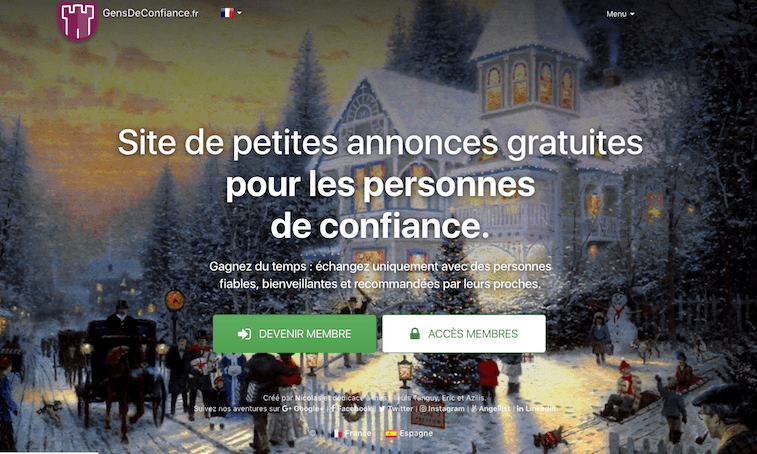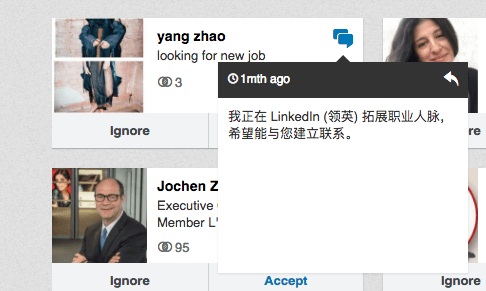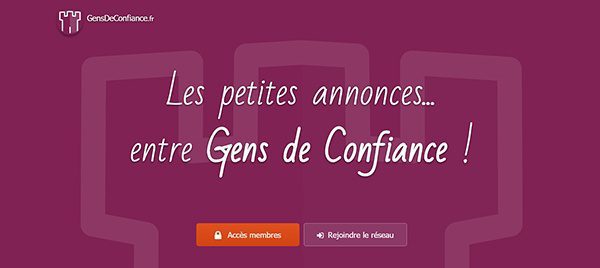As we struggle to distinguish between fact and fiction online (e.g. fake news), we also need to establish and find our own way to determine if someone on the other end is a person of confidence. Who for you are people of confidence? The answer is inevitably different for each of us. I was recently invited to join a French-based social network/classifieds site entitled “Gens de Confiance” (GDC) or “People You Trust.” GDC positions itself first and foremost as a classifieds site, yet it has an air of social network. The three founders all come from Nantes. For now it is only available in French and Spanish. To get into the network, you need three previously accepted friends to endorse you. Inserted in my welcome message, there are apparently 30,000 people still waiting to get approved into the network. Implicitly, I took it that these 30,000 people were not “people of confidence.” In a symptom of how hard it is to remain authentic all the while growing a business, the welcome message is signed by one of the founders (Enguerrand Léger), yet is sent from someone else’s account (Nicolas Davoust). How does that inconsistency make me feel about their trustworthiness?

Like anything, we will start to form our opinion based on the actions of those in it… and most specifically about the founders, whose ideals were surely the inspiration for the site in the first place.
In Whom Do You Trust?
This GDC initiative does speak to the big question mark many people have about the Web: in whom do we trust? Share on X As the burgeoning cleavage in society continues to rip us asunder, the importance of trust becomes evermore important. Why would a Gens de Confiance network crop up? It must be that Facebook (and all other social networks) doesn’t provide this assurance. Perhaps it is because Facebook is the world’s amorphous social network, owned and run by people perceived to be untrustworthy and where anything and everyone joins. Or is it the way that Facebook is being used? It doesn’t provide an easy way to exchange services?
Invitation Process is Key
When I look at how people connect as “friends” on Facebook, it is very simple. Perhaps far too simple. One click to invite. One click to accept. No context is provided, so as the receiver, you need to recognize the name and profile image. If that doesn’t suffice — assuming you can be bothered — you need to check the mutual friends and whatever other information is provided. I have accumulated over 2000 FB “friends” over the years. This group is quite random as it reflects how I have evolved in my usage and context. At the outset, I was more liberal in accepting and friending. I was working at L’Oreal with many clients and more or less friendly colleagues around the world. Now that I am a sole trader, I have been more stringent in friending.
When someone connects with you on Facebook, the acceptance is binary: accept or reject. Although there is also the “wait and think about it” option. In Linkedin, varying on occasion by country, connection requests are accompanied with a bland standard text. The vast majority of requests are automated, impersonal and uninformative. As far as my acceptance process goes, if I don’t recognize the name, I do a cursory check on the profile. But for at least half of the requests, they look or feel like the request below from a certain yang zhao: A photo I can’t understand or recognize. A standard message (in this case, in Chinese). And a non-descript job description.

We’re not talking about influence, but trust. Tools like Klout, Traackr and Peer Index don’t help you to garner or detect trust. It’s an intuitive approach each and everyone of us practices in our own way. A site like Craigslist has been my go-to site for classifieds because of the community feel. Unlike GDC, the mutual trust phenomenon that accompanied the classified site Craigslist in the early days was entirely implicit and experienced. We were a global community of English-speaking people with a dose of the San Francisco Peace&Love spirit. Ultimately, unfortunately the evil side of the Internet got the better of Craigslist.
What are the chances that a site like Gens de Confiance actually grows and then stays relevant? Maybe the ability to sanction members and the exclusion of companies will be helpful. But can it last? Unfortunately, I don’t harbor much hope. Your opinion?












Trackbacks/Pingbacks